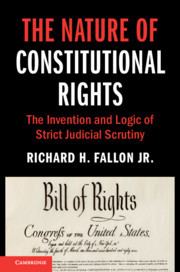Description
The Nature of Constitutional Rights
The Invention and Logic of Strict Judicial Scrutiny
Cambridge Studies on Civil Rights and Civil Liberties Series
Author: Fallon Jr. Richard H.
Explains constitutional rights, how courts must identify them, and why their protections are more limited than most people think.
Language: English
Subject for The Nature of Constitutional Rights:
Approximative price 27.67 €
In Print (Delivery period: 14 days).
Add to cart
The Nature of Constitutional Rights
Publication date: 03-2019
220 p. · 15.2x22.8 cm · Paperback
Publication date: 03-2019
220 p. · 15.2x22.8 cm · Paperback
Approximative price 82.73 €
In Print (Delivery period: 14 days).
Add to cart
The Nature of Constitutional Rights
Publication date: 03-2019
220 p. · 15.6x23.5 cm · Hardback
Publication date: 03-2019
220 p. · 15.6x23.5 cm · Hardback
Description
/li>Contents
/li>Biography
/li>
What does it mean to have a constitutional right in an era in which most rights must yield to 'compelling governmental interests'? After recounting the little-known history of the invention of the compelling-interest formula during the 1960s, The Nature of Constitutional Rights examines what must be true about constitutional rights for them to be identified and enforced via 'strict scrutiny' and other, similar, judge-crafted tests. The book's answers not only enrich philosophical understanding of the concept of a 'right', but also produce important practical payoffs. Its insights should affect how courts decide cases and how citizens should think about the judicial role. Contributing to the conversation between originalists and legal realists, Richard H. Fallon, Jr explains what constitutional rights are, what courts must do to identify them, and why the protections that they afford are more limited than most people think.
1. The historical emergence of strict judicial scrutiny; 2. Strict scrutiny as an incompletely theorized agreement; 3. Rights and interests; 4. Tests besides strict scrutiny and the nature of the rights that they protect; 5. Legislative intent and deliberative rights; 6. Rights, remedies, and justiciability; 7. The core of an uneasy case for judicial review.
Richard H. Fallon, Jr is Story Professor of Law at Harvard Law School, Massachusetts, and an Affiliate Professor in the Harvard Government Department. A former Rhodes Scholar, Fallon served as a law clerk to Judge J. Skelly Wright and to Justice Lewis F. Powell of the United States Supreme Court. Fallon has written extensively about Constitutional Law and is the author of multiple books including, The Dynamic Constitution (Cambridge, 2nd edition, 2013) and Law and Legitimacy in the Supreme Court (2018).
© 2024 LAVOISIER S.A.S.




